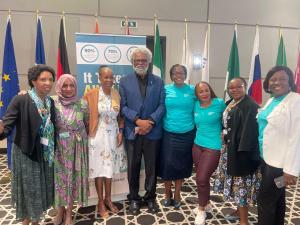South Africa, WHO, and Unitaid urge G20 to accelerate global action on cervical cancer elimination
Durban, South Africa - On the margins of the G20 Health Working Group meeting, health leaders from South Africa, the World Health Organization (WHO), and Unitaid co-hosted a high-level side event focused on accelerating progress toward the elimination of cervical cancer—a preventable disease that continues to claim the lives of women, particularly in low- and middle-income countries.
Titled Driving global progress toward the elimination of cervical cancer through UHC: Equity, financing, and innovation, the event convened policymakers, technical experts, advocates, and financing partners to explore scalable solutions across the continuum of care from prevention and screening to timely treatment. The session emphasized the urgency to place cervical cancer elimination as both a public health priority and a shared global responsibility.
A public health and equity imperative
Opening the event, Dr S.S.S. Buthelezi, Director-General of South Africa’s National Department of Health, reaffirmed the country's commitment to eliminating cervical cancer within the broader framework of universal health coverage (UHC). “Global efforts to combat cervical cancer serve as a concrete illustration of how cooperation can advance women’s health,” he said. Highlighting the disease’s disproportionate impact on women in low-resource settings, Dr Buthelezi called for coordinated action to expand access to HPV vaccination, screening, and early treatment.
Delivering the keynote address, Professor Groesbeck Parham, expert with the WHO Cervical Cancer Elimination Initiative and the University of Zambia, emphasized that the elimination of cervical cancer is not only achievable, but presents a pivotal opportunity to transform service delivery. He stressed that investing in elimination efforts can mitigate the devastating social and economic impacts of cervical cancer on women, their children, families and communities.
Professor Parham advocated for people-centered, locally led approaches that leverage innovations including artificial intelligence in diagnostics, digital health tools, and simplified single-dose HPV vaccination strategies. These tools, he noted, can help countries save lives, protect families, preserve livelihoods, and strengthen health systems.
Moderated by WHO Representative to South Africa, Ms Shenaaz El-Halabi, two panel discussions explored people-centered solutions, implementation challenges, and opportunities for sustainable financing.
Access, equity, and the role of communities
A panel on access and equity explored how health systems can better respond to the needs of women and girls through integrated and community-based approaches. Panelists included Ms Carol Nawina of CITAMplus Zambia who emphasized the importance of meeting women where they are, advocating for self-sampling and “one-stop-shop” models that honor women’s time, autonomy, and unique health needs.
Adding, Dr Letticia Moja from Rob Ferreira Hospital highlighted the importance of reaching adolescent girls through school-based HPV vaccination programmes and innovative outreach strategies.
Professor Koleka Mlisana of the National Health Laboratory Service underscored the critical role of diagnostics in healthcare delivery, stating, “Seventy percent of the decisions a health provider makes are based on lab systems.”
Financing for scale and sustainability
A second panel focused on financing for scale and sustainability, exploring how countries can unlock domestic resources and adopt innovative financing mechanisms to scale-up cervical cancer interventions. Dr Thomas Mourez, representing Expertise France, described how WHO’s Cervical Cancer Prevention and Control Costing Tool (C4P) is helping countries align investments with national priorities.
Dr Magda Robalo of the Institute for Global Health and Development advocated for integrated financing models that strengthen women’s broader health systems.
Dr Tenu Avafia of Unitaid also emphasized that affordability must not be a barrier to implementation highlighting Unitaid’s support for introducing cost-saving technologies like thermal ablation to expand access to high-quality screening and treatment services across low- and middle-income countries. “We’ve shown that WHO-recommended interventions work even in the most resource-limited settings,” Dr Avafia noted.
A collective call to action
Closing the session, Dr Nono Simelela, Advisor to South Africa’s Minister of Health, called for bold political leadership and moral clarity in eliminating the only cancer that is preventable with existing tools. She framed cervical cancer elimination as an issue of equity and human rights, urging countries to act decisively and collectively.
Reflecting on the key insights from the sessions, Ms Shenaaz El-Halabi, WHO Representative to South Africa, remarked
“We have the tools and the strategies to work towards eliminating cervical cancer. We welcome the leadership of G20 countries in advancing equitable access and sustainable solutions because women’s lives matter, no matter where they live.”
Participants reaffirmed their commitment to the 2030 elimination targets and encouraged G20 countries to lead with concrete investment in resilient health systems ensuring that every woman and girl can access the care she needs.
Learn more about WHO’s work on cervical cancer elimination: https://www.who.int/initiatives/cervical-cancer-elimination-initiative
Related link:
- Media Statement: Cervical cancer elimination is critical to advancing gender equality poverty reduction and global health goals - 27 March 2025
(National Department of Health, South Africa)
WHO Regional Office for Africa
Email: mroberts [at] who.int (mroberts[at]who[dot]int)
351 Francis Baard Street Pretoria,
South Africa PO Box 13113 7th Floor,
Metropark Building
Telephone: +27 12 3057709
Facsimile: +27 12 3057729
Email: afwcozawr [at] who.int (afwcozawr[at]who[dot]int)
Media enquiries: afwcozamedia [at] who.int (afwcozamedia[at]who[dot]int)



